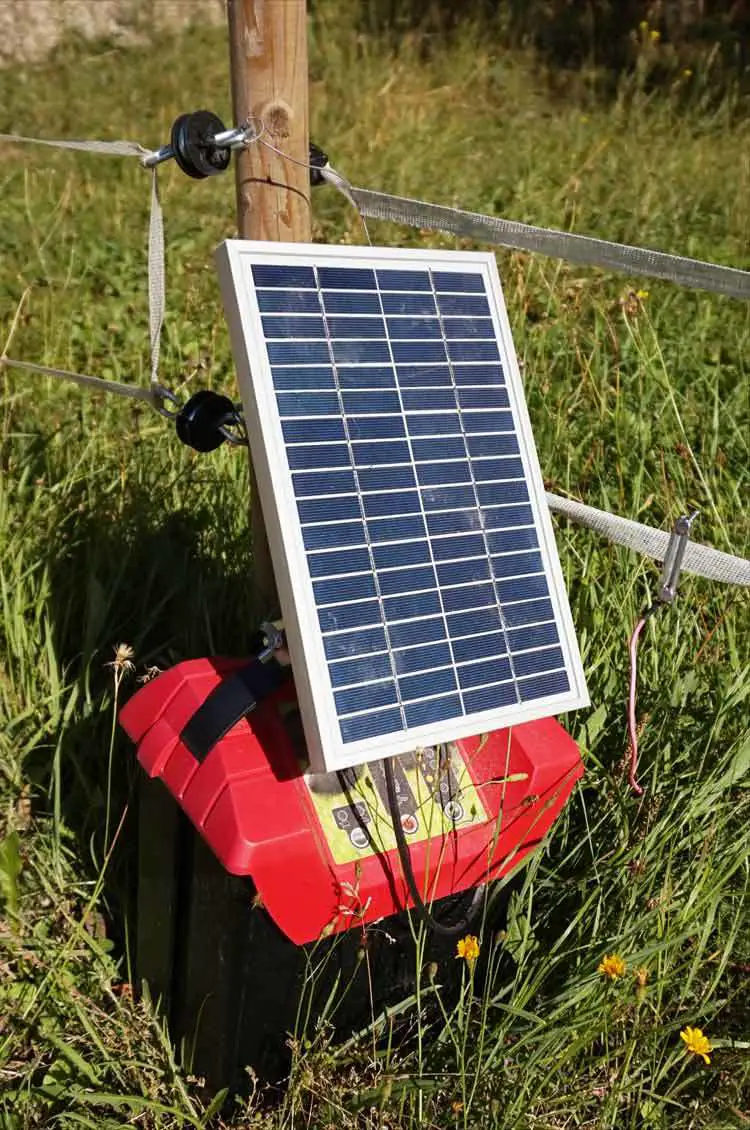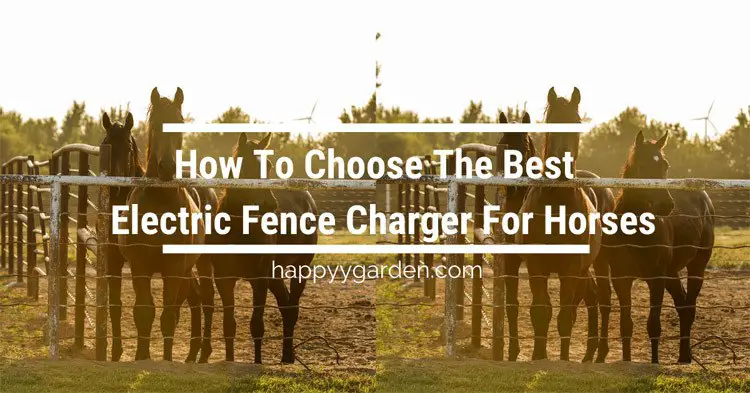How To Choose The Best Electric Fence Charger for Horses
The only way of securing your horses from straying and preventing predators from getting into your farm is through a good and useful electric fence. As you know, an electric fence cannot operate without a suitable electric fence charger. While the electric fence is essential, the charger is considered the heart of the entire system. So, what do you put into consideration when purchasing the best electric fence charger for horses? We will look at the essential factors to consider when purchasing an electric fence charger, as well as provide you with the top five electric fence chargers in the market.
Also Read:
- Best Electric Fence Charger for Goats and Sheep
- Top 5 Best Horse Pasture Fertilizers In The Market Today
Buying an electric fence charger first under its basics, and how they operate. Otherway, you will find the process of selecting an electric fence charger an overwhelming process. Some of the questions you need to answer when picking an electric fence charger are, what makes the electric fence charger you are about to pick different from others? What size and power suit my farm? How do I then decide which electric fence charger to take home?
Table of Contents
Top Five Best Electric Fence Charger For Horses
You will be awarded of the critical factors to consider when choosing the best electric chargers for horses, it is prudent that we introduce you to the top electric chargers in the market. We have based the list purely on customers’ views. We also give the pros and cons of each product.
Image | Product | Rating | Price |
|---|---|---|---|
If you are looking for a permanent but an electric fence charger for a small number of horses, a Gallagher electric fence charger suits you. The charger can deliver sufficient energy to up to 80 acres of a multi-wire horse farm. With this type of charger, you have 3.0 joules energy of low impedance energy. The electric charger is digital, and so you can check its performance by scanning the output voltage. The manufacturing company gives you a two-year warranty.
Pros
Cons
This is a 25-mile AC low electric charger suitable for keeping your horses in the ranch and predators away. It is waterproof hence ideal for wet areas. Also, it has a green and red indicator to show when the system is working or not. With high energy, Zareba 25 can deliver powerful but safe shocks that keep the horses away from the fence.
Pros
Cons
Parmak magnum is one of the best solar electric fence chargers for horses. It comes with the latest solar panels. With this system in your field, you will no longer waste time changing batteries in your electric fence. As long as the sun is available, you will always have your electric fence charged.
The system is waterproof; therefore, you don’t have to worry about extreme wet conditions. Parmac Magnum can comfortably charge up to 30 miles of fence. It comes with a battery hence saves you money. After purchase, let the battery charge thoroughly before using it.
Pros
Cons
If you want to keep your horses within a specific boundary, this unit can do the job for you. One thing that makes it the best solar-powered electric fence charger for horses is that it delivers 0.15 joules.
What is more is that it has an in-built solar panel. When fully charged, it can keep your electric fence charged for up to two weeks. Its installation is easy with simple terminal knobs. The facility is complete once you connect the green knob to the ground and the red to the fence line.
Pros
Cons
For someone looking for a high voltage power, electric fence, Tylor Cyclops best suits them. It is an excellent gadget that gives more than just a punch. Depending on your needs, the charger delivers a minimum of 5 joules and a maximum of 10 joules. The fence serves extremely aggressive horses or predator infested areas. The charger is easily the most expensive and expensive on the list.
Pros
Cons
Electric Fence Charger Terminologies
Well, you are probably not an engineer and not familiar with some electrical terms. Sellers at times get cheeky and would want to confuse you with some terminologies. Knowing that you do not understand them, they will throw in some of these words to confuse you. Therefore, you must follow them to avoid embarrassment or confusion. Here are some of the most commonly used terms for electric fence chargers.
Low-Impedance - It means that the energizer has less resistance hence less resistance and more power through the electric fence charger. Electric fence chargers with low impedance are suitable for farms filled with weed.
Continuous Output - This term refers to a state of an unbroken or stable charge, unlike pulsing charges. Such a system suits smaller paddocks and dairy stalls.
Solid-State - These charger types deliver amperage of medium shock at a specified period. They are perfect for small animals and shorthaired livestock under light weed conditions.
Categories of Electric Fence Chargers
DC Or Battery-Powered
If there is no reliable electrical power near your farm, a DC powered electric power is a good option for you. This type of charger draws its power from either internal or external sources, making them a natural choice of use in a remote area. However, the batteries need to be changed occasionally to get the fence up and running throughout the day. The best way to avoid leaving your wall without protection is by getting several DC batteries. When one is on charging, the other is up and running.
How often you need to charge the batteries depend on the usage. If your animals often touch the fence or the farm has weed, the cells will drain faster. The wires need to remain transparent to avoid a situation where you frequently charge your DC batteries. Also, train your horses to avoid the fence. However, during the early stages of the training, the horses will touch the wall more hence draining the battery faster. Either, frequently check the charge of your battery using a voltage meter to maintain the security of your farm.
Solar-Powered

Solar powered electric fence charger
From the name, you can understand where the fence chargers gain power. This another alternative fence charger if you don’t have reliable electric power in your area. Just like the DC type, the charger draws its power from the battery. However, it has a solar panel connected to it. The solar recharge the battery, which keeps the fences charged throughout the day.
The best thing about the solar-powered electric fence is that you don’t need multiple batteries to keep your wall running. It is lightweight hence easy to transport. One major undoing of a solar-powered cell is that without sunlight, the battery won’t recharge.
Most farmers prefer acid batteries for their solar-powered fences. These types of batteries last up to 1000 days of use before displeasure. Experts recommend gel-cell solar cells as back up to ensure unbroken power in your electric fence.
AC Powered
This type of electric fence charger connects directly to an electrical grid. You can either choose to plug the charger to the barn wall or use an extension cable to energize the house closer to the electric fence. However, the long-term solution is plugging the charger into the wall.
AC powered electric fences are not suitable for use in the remote areas simply because you need reliable electrical power. Also, the other two options are cost-effective and ideal for small ranches. Furthermore, horses are not as nutty as other animals.
Factors to Consider When Choosing an Electric Fence Charger
The choice of electric fence charger you take home is vital since it is the soul of your fence system. Much as an electric fence is essential, the charger is what determines its efficiency. Here are various factors to consider when choosing the best electric fence charger for horses.
Area of encloser
Even if you are thinking of enclosing a small space, you might think of expanding the number of horses in the future. Therefore, a powerful electric charger is an excellent choice to avoid purchasing a more powerful charger once you develop. Usually, electric fence chargers will indicate the area of enclosure and whether the electric fence is suitable for walls with weed.
Type of horses
Larger horses require stiffer shocks than smaller horses. Even more, if your horses are more aggressive, you will need high impedance electric fence chargers.
Powering
As mentioned earlier, powering an electric fence charger depends on your location. A DC and Solar-powered system are suitable for remote areas, while an AC-powered system is suitable in areas with reliable electrical sources.
Number of wire strings
The more the number of wire strings on your fence, the more the power needed. When considering the sum of wires required, the general rule is that you divide the fence charger rating by the total number of strings.

What is the best electric fence charger for horses?
Net line types
Compared to steel, poly wire or tape create more electrical resistance. The most recommended wire types are those with less defiance.
Impedance
The best electric fence charger is one with low impedance simply because weeds and brush decrease the energy when they touch the fence. Only animals like show horses and goats should have high impedance.
Joules
The impact of the overall power on the electric fence charger is an essential factor to consider. However, the type of electric fence charger depends on the purpose of the electric fence. An excellent electric fence charger is one with 1 to 3 joules electric power. You don’t want to injure your animals in the name of protecting them.
Installing an Electric Fence Charger
All-electric fence chargers come with a handbook of installation instructions. You are required to follow these instructions to the later. However, you should have some prior knowledge about the electric fences in advance. Here are the general guidelines to follow when installing an electric fence charger.
Unless you are using a solar-powered electric fence charger, ensure that the charger has protection from unfavorable weather conditions. If its box is not waterproof, keep it inside.
Keep it firmly to a ground system separate from a building used by other structures or systems.
If the source of power is AC, ensure that the charger is close to a 110-Volt source of energy.
Conclusion
Finally, ensure that you choose an electric charger that meets your needs irrespective of whether it appears in our list of best electric chargers for horses or not. An electric fence charger that works for me may not necessarily be your best choice. Also, an expensive electric charger does not mean it is the best. Spend your money depending on what you need for your farm. Get an extra powerful electric fence charger only if you are preventing predators from getting to your farm. If you consider all the factors above, you will, for sure, take home the most suitable electric fence charger for your horse farm.







